
謝謝 With thanks to


謝謝 With thanks to
音樂 普契尼
Music Giacomo Puccini
文本 朱塞培.賈柯沙、魯伊吉.伊利卡 Libretto 取材自昂利.穆傑小說
《波希米亞人的生活剪影》(巴黎,1845-1849)
Giuseppe Giacosa and Luigi Illica after Henri Murger’s stories Scènes de la vie de bohème (Paris, 1845-1849)
指揮 卡洛.里齊
Conductor Carlo Rizzi
原創導演 戈蘭.雅弗費特
Original Director Göran Järvefelt
重演導演 卡羅琳.錢尼
Revival Director Caroline Chaney

16-19.3.2007
香港文化中心大劇院
Grand Theatre
Hong Kong Cultural Centre
四幕歌劇,意大利原文演唱,附中英文字幕 演出長約2 小時30 分鐘,包括一節20 分鐘中場休息 An opera in four acts, sung in the original Italian with Chinese and English surtitles Running time: approximately 2 hours and 30 minutes with a 20 minute interval
除特別註明,所有照片© Bill Cooper
部份劇照來自以前製作
Unless otherwise indicated, all photographs © Bill Cooper Somephotographsdepictcastmembersfromprevious productions.
為了讓大家對這次演出留下美好印象,請切記 在節目開始前關掉手錶、無㵟電話及傳呼機的 響鬧裝置。會場內請勿擅自攝影、錄音或錄 影,亦不可飲食和吸煙,多謝合作。
To make this performance a pleasant experience for the artists and other members of the audience, PLEASE switch off your alarm watches, MOBILE PHONES and PAGERS. Eating and drinking, unauthorised photography and audio or video recording are forbidden in the auditorium. Thank you for your co-operation.
指揮卡洛.里齊
原創導演戈蘭.雅弗費特
重演導演卡羅琳.錢尼
歌唱家
ConductorCarlo Rizzi
Original DirectorGöran Järvefelt
Revival DirectorCaroline Chaney
馬塞洛
戴維.肯普斯特
魯道夫
格溫.休斯.瓊斯
(3月16 及 18 日)
保羅.查爾斯.克拉克 (3月17及19日)
哥林尼
戴維.索爾
蕭納德 歐文.韋伯
貝諾阿
霍伍德.柯克
咪咪
艾曼達.魯克羅夫
(3月16、18及19日)
娜奧米.哈維(3月17日)
帕皮諾 伊恩.嚴明
阿欽多羅
阿拉斯提.摩爾
慕茜達 夏洛特.埃莉特
關卡官員 祖利安.博伊斯
關卡官長 約翰.喬伯特
演員
杜威.薩維奇 戴維.蒂利 德里克.蒂利
群眾
學生、小販、店員、 女工、士兵、侍應等
Marcello
David Kempster
Rodolfo
Gwyn Hughes Jones (16 & 18 March)
Paul Charles Clarke (17 & 19 March)
Colline
David Soar
Schaunard
Owen Webb
Benoit
Howard Kirk
Mimì
Amanda Roocroft (16, 18 & 19 March)
Naomi Harvey (17 March)
Parpignol
Ian Yemm
Alcindoro
Alastair Moore
Musetta
Charlotte Ellett
Customs Official
Julian Boyce
Customs Sergeant
John Gilbert
Actors
Dewi Savage
David Tilley
Derek Tilley
Chorus of students, hawkers, shopkeepers, work-girls, soldiers, waiters, etc
暨
威爾斯國立歌劇院樂團 及合唱團
香港藝術節兒童合唱團
製作人員
Production Team
原創設計
米高.雅根
原創燈光設計
約翰.沃特豪斯
副指揮
邁克爾.克勞薩
音樂導師
羅素.摩爾頓
職員總監
力克.雅舒頓
語言教練
瑪莉亞.加絲雅.顧爾德
舞台監督
莉斯.沃卡
舞台佈景製作
卡迪夫劇場服務部
道具/化鞽及髮型
威爾斯國立歌劇院
英文字幕
西門.里斯
中文字幕
黃奇智
with the Orchestra and Chorus of the Welsh National Opera
Festival Children’s Choir
Original Designer
Michael Yeargan
Original Lighting Designer
John Waterhouse
Associate Conductor
Michal Klauza
Répétiteur
Russell Moreton
Staff Director
Nik Ashton
Language Coach
Maria Grazia Gould
Stage Manager
Liz Walker
Scenery built and painted
Cardiff Theatrical Services
Properties, costumes and wigs
Welsh National Opera
English surtitles
Simon Rees
Chinese surtitles
Wong Kee-chee
第一、二幕及第三、四幕之間將有簡短休息,請勿離座。
There will be brief pauses between Acts 1 & 2 and Acts 3 & 4 during which the audience is requested to remain seated.
第一幕 聖誕前夕,小閣樓內 火爐况已無柴可燒,「偉大」的詩人魯道夫 和他的朋友 「偉大」的畫家馬塞洛,寒 冷難抵,馬塞洛把寒冷比喻他的舊情人慕 茜達冷若冰霜的心。魯道夫把他的劇作初 稿投進火爐燃燒。他們的朋友 「偉大」 的哲學家哥林尼來到,抱怨聖誕節前夕所 有當舖都關了門。就在手稿即將燃盡時, 「偉大」的音樂家蕭納德帶着錢、食物、木 柴等回來,並向大家講述他的發財經歷。
The ‘great’ poet Rodolfo and his friend the ‘great’ painter Marcello are freezing cold, with no fuel for their stove. Marcello compares the chill to the icy heart of Musetta, whom he once loved. Rodolfo burns a draft of his play in the stove. Their friend the ‘great’ philosopher Colline arrives, annoyed that the pawn shops are not open on Christmas Eve. The ‘great’ musician Schaunard arrives, just as the fire has consumed the play. He brings money and provisions and tries to describe how he earned this bounty.

蕭納德形容外面拉丁區非常熱鬧,滿街都 是美食和美女,勸大家不要呆在陋室况浪 費美好的平安夜;就在他們準備離開時, 房東貝諾阿到來,向他們催討過期房租, 馬塞洛因先前見過他與一個女人一起,就 藉詞鼓勵他吹噓自己的風流韻事,其他人 假裝不憤,把他趕出去。蕭納德、哥林尼 和馬塞洛一起,前往摩姆咖啡館,魯道夫 則留下來完成他的文章。
魯道夫想集中精神但卻心煩氣悶。這時咪 咪敲門,她抱歉打擾魯道夫,說因為蠟燭
He persuades the others not to waste Christmas Eve indoors when the Latin Quarter is so full of life, food and girls. Before they can leave, their landlord Benoit appears and asks for the overdue rent. Marcello has seen him with a woman, and encourages him to boast of his amorous exploits. The others pretend to be outraged, as a way of getting rid of him. Schaunard, Colline and Marcello leave for the Café Momus. Rodolfo stays behind to finish writing an article.
Rodolfo tries to concentrate but is not in the mood. Mimì knocks at the door, apologises for disturbing him and explains that her candle has gone out.
用完了,須要借個火;魯道夫請她進屋, 她卻在一陣咳嗽中暈了過去,魯道夫弄醒 她,看她一臉病容,提議她移近火爐,並 讓她喝點酒。咪咪稍稍恢復元氣,正想離 開,卻發覺丟了鑰匙。兩人摸黑尋找鑰 匙,終於魯道夫找到了,卻把它藏在袋 口,繼續假裝尋找,直至他的手碰上她 的。
魯道夫的朋友催促他快來會合,他說自己 此刻並非獨自一人。相約好在摩姆咖啡館 見面後,朋友們便由得魯道夫跟他的「詩 篇」在一起。月光中魯道夫和咪咪互訴衷 情,然後手挽手離開。
第二幕 拉丁區
小販爭相向行人叫賣,咖啡館况的顧客也 喧嚷熱鬧。
幾個朋友圍坐在咖 啡館的一張桌子, 魯道夫向咪咪介紹
他的朋友。玩具小 販帕皮諾的聲音在 遠處響起。他們點
了晚餐,一對戀人
沐浴愛河,馬塞洛 卻因見到舊愛慕茜 達而心生不忿;慕
茜達身邊是挽着一 大堆送贈她的禮物 的國會議員阿欽多羅;她堅持要在咖啡館 坐下來。咪咪很羡慕慕茜達的打扮,但馬 塞洛卻警告說,她是魔鬼的化身、一隻吃 人心的猛禽;當慕茜達發現馬塞洛故意不 理她,便刻意吸引他的注意。
Rodolfo invites her to enter. She is overcome by a fit of coughing and faints. Rodolfo tries to revive her and suggests she move closer to the fire, offering her wine. Somewhat recovered, she goes to leave but announces that she has lost the key to her room. In the dark they both look for the key, which Rodolfo finds and pockets, though he pretends to continue looking. His hand finds hers.
Rodolfo’s friends call to him to hurry up. When he reveals that he is not alone they agree to meet at the Café Momus and leave Rodolfo with his ‘poetry’. In the moonlight Rodolfo and Mimì recognise their love for one another. Rodolfo offers Mimì his arm and they leave together.
Street vendors compete to sell their goods to the crowd while customers at the Café Momus call for service.
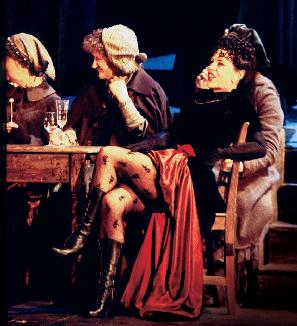
The friends take over a table in the Café Momus and Rodolfo introduces them to Mimì. In the distance can be heard the voice of the toy seller Parpignol. The friends order supper. The lovers’ delight in one another is offset by Marcello’s bitterness as he sees Musetta approaching. She was once his beloved, now she is accompanied by a pompous old Councillor of State, Alcindoro, weighed down with the presents she has bought with his money. Musetta insists on sitting at a table in the Café. Mimì admires her outfit but Marcello warns that she is Temptation, a bird of prey who consumes human hearts. When Musetta becomes aware that Marcello is ignoring her, she tries to attract his attention.
慕茜達立心要擺脫她的靠山,便嚷着說她的 鞋太緊,着阿欽多羅去再買一對。馬塞洛發 現自己還愛着慕茜達。當侍者遞上帳單,他 們才知道原來錢已花光,慕茜達堅持要把帳 單與她的算在一起,然後一同離開咖啡館, 留下那張大帳單給阿欽多羅。
Determined to rid herself of her protector, Musetta complains that her shoe is too tight and orders Alcindoro to buy her another pair. Marcello realises that he still loves her. When the waiter brings the bill the friends find they have spent all their money. Musetta insists that their bill be added to hers and they all go off together into the crowd. They leave the large bill for Alcindoro.
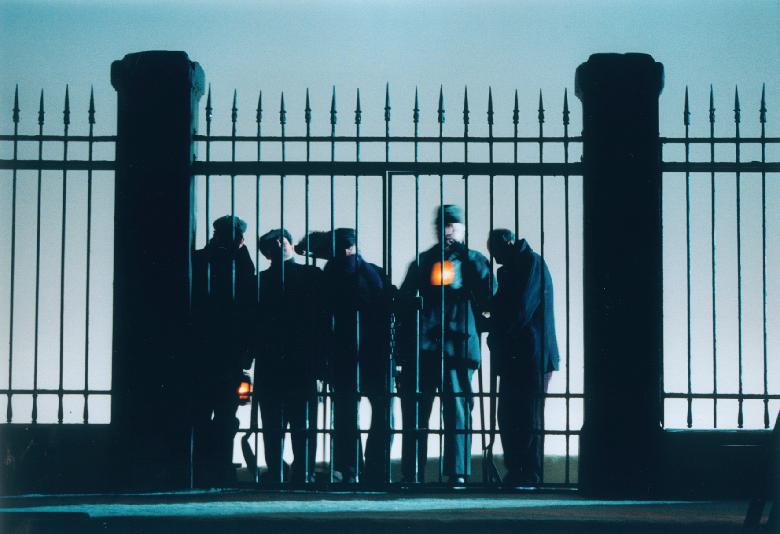
第三幕 地獄門,二月 黎明時份,進入巴黎的城門上,關卡官員 在打瞌睡,清道夫把他們叫醒好讓其進 城;在附近的酒館傳來慕茜達和同伴的嘻 笑聲,馬車伕、賣牛奶的少女和農婦陸續 進城。
咪咪來找馬塞洛,她身體虛弱,疲累極 了,馬塞洛請她入內,被她婉拒,她道明 來意說因為魯道夫被妒嫉矇蔽,所以找馬 塞洛幫忙;馬塞洛說他跟慕茜達的關係隨 心得多,所以麻煩少得多。他答應替咪咪 解憂,送她離開,但她卻躲起來;魯道夫 抱怨咪咪用情不專,當馬塞洛說他言不由 衷時,他才吐露原委,說是因咪咪的肺病 太重,恐怕命不久矣;咪咪聽到全部對 話,她的咳嗽暴露了藏身之處,魯道夫於 是想把她帶進屋內取暖,但她仍拒絕;這 時,馬塞洛聽到慕茜達的笑聲,於是趕去 看她又在跟誰調情。
咪咪跟魯道夫道別,吩咐他把自己留在他 家的雜物收拾好,她會找人過去拿走,但 他可以留下小帽子作紀念。魯道夫和咪咪 難捨難離,盼望春天快臨,那邊廂馬塞洛 和慕茜達卻爭吵起來。
The hour before dawn. Customs officers doze inside the tollgate into Paris. Street sweepers wake them up to be let in. From the nearby tavern can be heard the sounds of merrymaking led by Musetta. Carters, girls selling milk and peasant women pass through the gate.
Mimì arrives, ill and exhausted. She asks to see the painter Marcello. He invites Mimì inside, but she refuses, explaining that Rodolfo is consumed with jealousy. Marcello claims that his relationship with Musetta is less problematic, because it is so lighthearted. He agrees to help Mimì and sends her away in fact, she hides. Rodolfo complains that Mimì is a terrible flirt, but when Marcello suggests his fury is not sincere, he admits the real reason: Mimì is so ill with consumption that she will die soon, Mimì has overheard all this and her coughing betrays her presence. Rodolfo tries to lead her into the warmth but she won’t let him. Marcello hears Musetta laughing and leaves to find out with whom she is flirting.
Mimì says goodbye to Rodolfo, asking him to collect together all the little things she has left in his apartment she will send someone round for them, but he is to keep the bonnet as a reminder of her. Marcello and Musetta quarrel while Rodolfo and Mimì look forward to spring.
第四幕 閣樓內
馬塞洛和魯道夫雖然假裝埋頭工作,卻都 心不在焉。魯道夫告訴馬塞洛他碰到慕茜 達,她貪圖新歡給她的物質享受,早已忘 卻舊愛;馬塞洛反唇相稽,說他也看到咪 咪穿得像皇后一樣。
昨天的午飯後他們已經沒吃過,此刻蕭納 德和哥林尼帶了小量食物回來解困。
突然間,慕茜達衝進來,說咪咪已經病入 膏肓,現在就跟在她後面。
慕茜達告訴他們,說她聽到咪咪離開了子 爵,已經氣若柔絲,走到生命盡頭。她說 咪咪想死在魯道夫的身邊。
他們告訴慕茜達閣樓况已經沒有食物。咪 咪跟朋友道了好;慕茜達拿下她的耳環, 讓馬塞洛去變賣,好拿點錢去買藥和請醫 生。慕茜達跟着馬塞洛出去,為咪咪買一 個暖手籠,這是她最後的要求。
哥林尼決定把他的大衣典當,跟蕭納德一 同離開了。
咪咪和魯道夫回憶他們初次相遇及墮入愛 河的經過。幾位朋友帶着暖手籠和藥物回 來,魯道夫告訴哥林尼咪咪正在安靜的睡 着,但蕭納德在馬塞洛耳邊輕輕說:她已 經離世了。
Pretending to be hard at work, Marcello and Rodolfo are both distracted. Rodolfo describes an encounter with Musetta, who has forgotten her love in the comfort of a new liaison, while Marcello retaliates by describing how he saw Mimì dressed like a queen.
They have not eaten since yesterday lunchtime. Now Schaunard and Colline bring a little food.
Suddenly Musetta enters with the news that Mimì is following behind her, but very ill.
Musetta explains how she heard that Mimì had left her Viscount and was now exhausted, at the end of her strength. Mimì had told her that she wanted to die near Rodolfo.
The friends tell Musetta they have no food left. Mimì recognises and greets her friends. Musetta takes off her earrings and sends Marcello to sell them, so as to buy some medicine and send for a doctor. She follows him to buy Mimì a muff her last request.
Colline decides to pawn his overcoat, and leaves with Schaunard.
Mimì and Rodolfo remember how they first met and fell in love. The friends return with the muff and the medicine. Rodolfo tells Colline that Mimì is sleeping peacefully, but Schaunard whispers to Marcello that she has died...
西蒙.利斯訪問音樂總監卡洛.里齊 重溫《波希米亞生涯》
Music Director Carlo Rizzi, interviewed
假若上天要毀滅所有歌劇曲譜,而我只可 以選擇一套倖免於難的話,我常說那一定
是《波希米亞生涯》,這並非純綷基於個人 喜好,而是因為這套作品的代表性。
《波希米亞生涯》的歌劇譜是完美的,沒有 一個多餘的音符;雖然這齣歌劇廣為人所 熟悉,但它其實是極難指揮的,問題就在
於每個人都以為自己懂得《波希米亞生 涯》,但這卻與事實大相逕庭。我對此劇 研究經年,回想我能有幸親睹卡洛斯.克 萊貝爾多次的指揮,更是一個永世難忘的 經歷。
每一次重溫《波希米亞生涯》,我都覺得此 劇百聽不厭、歷久常新,當中原因凡幾: 音樂方面,不斷創新的旋律叫人拍案叫 絕;劇情方面,感人的故事取材自真實的 生活,有別於傳統歌劇的形式,每一場景 都切合時代,令觀眾更覺故事真實,而非 虛構。
除了這些音樂和戲劇上的獨到,還有一些 較不明顯的特點,也值得向觀眾道出,配 器就是其一。《波希米亞生涯》的樂譜配器 豐富,充滿啟發性;人們一般都視拉威爾 為二十世紀最傑出的配器高手,但當你看 到《波希米亞生涯》况的一些樂器組合,便 會發現普契尼的天才也不遑多讓。
I have often said that if I could only save one opera score from destruction, it would be La bohème, not just because of what it means to me personally, but because of what it represents.
It is the perfect opera score: not one note too many, not one note too few. As an opera, it is extremely difficult to conduct, which might come as a surprise given how well known it is. The problem is that everyone thinks they know La bohème . Nothing could be further from the truth. I have spent years learning about it, especially during the period when I was able to watch Carlos Kleiber conducting the opera many, many times, an unforgettable experience.
Every time I come back to La bohème, I find I am never tired of it, and it always comes fresh off the paper. This is because of a number of reasons. The level of the music, with its constant melodic invention, is fantastically high. The level of drama, with its moving story, taken from real life, has nothing conventionally operatic about it. Each scene of the opera happens in real time, reinforcing the idea that it is a true story, not a work of fiction.
Apart from these musical and dramatic points, there are other more obscure points of interest that are worth bringing to people’s attention. The orchestration is an important one. The score of La bohème is a mine of inspired orchestration. It is generally supposed that Ravel was the greatest 20th century orchestrator, but when you look at certain blends of instruments in the score of La bohème

在《蝴蝶夫人》和《杜蘭朵》中,普契尼用了 充滿異國情調的樂器,如銅鑼、木琴等,
去營造東方情調,但在《波希米亞生涯》, 他忠於他的創作所要表達的現實世界,沿 用一般的歐洲管弦樂器,但仍然能創造出 具有超凡原創性和地方色彩的音樂。
普契尼在變奏上的運用也很有意思,第二
幕開始時,帶出摩姆咖啡館的18 個音節奏 出的小號主題,在整套劇中重複出現,卻 各有不同:在第一幕,它襯托蕭納德所講
述聖誕節的街上怎樣喜慶歡騰;在第三 幕,咪咪以歌聲向魯道夫話別時,談到他 在市集贈她的粉紅小帽,我們再聽到同一
段音樂的旋律,但已改成一首情歌,不帶 半點一群頑童在街上奔走的情景。普契尼 巧妙地利用主導動機,在寫作主題變奏方
面一露其驚世技巧。
《波希米亞生涯》是一首簡約的歌劇,合唱
不多,主角也只有寥寥數位,要把它演 好,必須有出色的歌唱家。當計劃這個重 演時,我們希望突出威爾斯的歌唱家,從
而組成一個威爾斯班底,這並非狹隘的地 方主義,而是為了展顯我們本土的優秀人 才,並讓他們同台演出;非常幸運,我們
可以一償所願。劇院的成員都有着共同目 標:與大眾分享這個美妙的歌劇。
©威爾斯國立歌劇院
西蒙.利斯 為威爾斯國立歌劇院戲劇指導
you will find that Puccini is working at an equally high level of genius.
Unlike Madama Butterfly or Turandot, in which he used exotic instruments (gongs, xylophones and so forth) to create an oriental atmosphere, in La bohème Puccini stays faithful to the true world of his compositions, using nothing outside the normal range of European orchestral instruments, and still creating music of extraordinary originality and spirit of place.
Puccini’s use of variations is interesting, too. The trumpet theme at the opening of Act II, during the 18 bars that set the scene of the Café Momus, recurs several times during the opera, and is different each time. We hear it in Act I at the moment when Schaunard describes the Christmas festivities in the street below. In Act III, when Mimì sings her farewell to Rodolfo, she starts to talk about the little pink bonnet he bought her at the fair, and we hear the melody of the same fragment of music, so transformed that it sounds like a love song, not like a band of urchins running down the street. It is a subtle use of the leitmotiv, and it shows Puccini’s incredible skill in writing variations on a theme.
La bohème is a minimalist opera, with little chorus, and few principals. In order to perform it well, you need very good singers. When we planned this revival we wanted to give a greater emphasis to Welsh singers, and to create a Welsh cast for La bohème, not in a narrowly parochial way, but in order to show off our home grown talents, and put them all together. We have been very lucky in being able to do so. All of us are aiming for the same target: to share our enjoyment of this beautiful opera.
Simon Rees is the dramaturge for Welsh National Opera
文:戈蘭.雅弗費特
《波希米亞生涯》
這齣普契尼的偉 大作品,是演出
者和觀眾都喜愛 的歌劇;可是, 有時一齣歌劇受
到過份寵愛也有 危險。以這套膾 炙人口的作品來
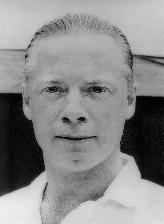
說,由於歌劇的音樂動人心弦,觀眾被緊 緊牽引,即使導演和演出差勁,他們仍然 感動;由咪咪進場那一刻,他們已為她在 劇終的病逝而掉下同情淚,甚至歌者都 「預知」自己的死亡,還非常清楚地表現出 來。
傳統的歌劇觀眾都不愛矛盾和衝突,他們 要的歌劇是輕鬆的,就像美食一樣,對他 們最愛的《波希米亞生涯》尤其如是。
你當然同情這幾個潦倒的藝術家,但他們 不是有個舒舒服服的閣樓足以安身嗎?還 在巴黎呢!他們雖然衣不禦寒、三餐不 繼,但那畢竟是學生無拘無束的生活的一 部份吧;咪咪實在楚楚可憐,但她人既漂 亮,唱歌更動聽呢!
劇中波希米亞人的生活並沒有被認真的對 待,人們往往用一個外在的、浪漫的角 度,並帶着一個中產階級的觀點去看劇中 人物的遭遇。
by Göran Järvefelt
La bohème, Puccini’s well-known masterpiece, is an opera that most people love. But operas can be loved too much both by the performers themselves and by the audience. There is a danger of this with this particular piece because of its popularity. The music captures the audience, who are touched even if the staging is bad. The audience know when Mimì enters that she will die in the last act, and they shed a few tears. The singer herself often knows this too, and makes it clear.
The conventional opera audience is afraid of conflict. They want opera to be relaxing, a culinary delight especially their favourite La bohème.
Certainly you feel pity for the poor artists but even so, they have a cosy existence up under the roofs of Paris! They are cold, and they haven’t enough food for the day, but that’s all part of a student’s carefree life. It is a shame about Mimì, but she is pretty to look at and she sings beautifully!
The life of the Bohemians is not taken seriously. It is observed from the outside and in a romantic light, from a middle-class perspective.
Puccini’s music is not sentimental. It calls upon us to identify with the young artists and to take their problem-filled circumstances seriously.
The Bohemians live in a transitional state, a progressive phase that leads to the academy, the mental hospital or the grave.

普契尼的音樂並不煽情,它引領我們代入 這群年輕的藝術家的生活,認真地思考他 們落魄的苦況。
這群年輕人活在一個過渡期,他們最終可 能走進學院、瘋人院甚或是墳墓。
對生命的追求使幾個藝術家目空一切,他 們擁有旺盛的創造力和遠大的理想,全心 投入藝術,可惜社會的建制卻不 至少 不是波希米亞的藝術,他們的希望隨着劇 情的進展逐漸破滅,這群藝術家開始要妥 協、出賣自己,好友之間的關係備受考 驗,最後瀕臨崩潰。現實的環境與社會壓 力造成這個結局。金錢主宰一切。
為了使《波希米亞生涯》的製作更富真實 感,在選角上都着重年輕的歌唱家,這方 面我一直都很幸運,每次我導演此劇都能
They have an appetite for life that defies all, and they are full of creative force and vision. They believe in art. The establishment does not not in the Bohemian’s art, anyway. Their hopes are dashed more and more in each scene of the opera. The artists have to start compromising, or sell themselves. The personal relationships between them are sorely tried. They all break. External circumstances and social pressure are the cause of this. Money, money, money...
For a production of La bohème to be believable it has to be cast with young singers. I have been lucky enough to get this requirement fulfilled every time I have directed the piece. I have done this in Gelsenkirchen, Cardiff and Vancouver.
The production has on all occasions been realistic. The poet Rodolfo, the painter Marcello, the musician Schaunard and the philosopher Colline share a simple attic flat. They live in cold, poverty
找到適合的人選,在德國的蓋爾森基興如 是,在卡迪夫、溫哥華亦如是。
每次製作我都採用現實的手法。詩人魯道 夫、畫家馬塞洛、音樂家蕭納德和哲學家 哥林尼同住在一間簡陋的閣樓,活在寒 冷、貧窮和飢餓中,所有家當就只得一個 火爐、一張老桌子、四張床墊、四隻杯、 四個牙刷和一個鍋。
在最後一幕中,房子如舊,但卻四壁徒 然,只有床墊和一束花,而那花束插在瓶 况,就放在房子中間。正值夏天,馬塞洛 在畫一幅靜物畫,這是買家想要的題材; 他在第一幕所表現的想像力和個人藝術風 格根本沒有銷路。
由首幕到結局,給人彷如隔世之感,每一 個人都改變了,就如歲月經年。
為了生活,慕茜達和咪咪要把自己賣給富 有的男人。濃妝艷抹、染着紅髮、衣着華 麗的咪咪,外表雖然煥然一新,但當死亡 臨近,她仍然希望回到自己惟一深愛的魯 道夫身邊;受着肺病的折磨,她一拐一拐 的攀上老閣樓,她的死是歡愉和平靜的, 相比之下,她的生命卻是痛苦和顛簸的。
第三幕是悲哀的凝聚,愛情的不可能在現 實社會環境下表露無遺。房東貝諾阿和慕 茜達年老富有的情人阿欽多羅代表社會的 建制,兩個都是很重要的角色。
歌劇怎樣凝煉為一種藝術形式,《波希米 亞生涯》正是一個示範;文字和音樂各有 表述,讓我體會導演藝術的深層意義。
魯道夫和咪咪的初遇就是一個好例子。聖 誕前夕,朋友都去了咖啡館慶祝,魯道夫 獨自一人留下來寫報章文稿,他靈感枯 乾、心情煩躁;咪咪住在同一棟屋子,她 早已為閣樓這班喧鬧的藝術家着迷,剛見 他們離開,就趁機去認識她傾慕已久的詩
and hunger. They own a stove, an old table, four mattresses, four mugs, four toothbrushes and a saucepan.
The same attic flat is totally empty in the last act apart from the mattresses and a flowering branch, which is propped in a bottle in the middle of the floor. It is now summer and Marcello is painting a still life. That is what the buyers want. His imaginative and personal way of painting in the first act wasn’t profitable.
It feels as if a whole lifetime has passed between the first and the last acts. Everybody has changed. Many years have gone by.
Musetta and Mimì’s rescue has been to sell themselves to rich men. The totally transformed Mimì (wearing make-up, with dyed red hair and luxurious clothing) still wants to die with Rodolfo, the only man she’s ever loved. Suffering from consumption, she staggers up to the old attic flat. Her death is happy and tranquil. Her life was unhappy and stormy.
The third act is the most tragic. In it, love’s impossibility is exposed under the current social circumstances. The establishment is represented by Benoit, the landlord, and Alcindoro, Musetta’s wealthy, aged lover. These are both very important characters.
La bohème is to me an example of the essence of opera as an art form and of the deeper meaning of the art of directing, when the words say one thing and the music says another.
Rodolfo and Mimì’s first meeting is a typical example. It’s Christmas Eve. The friends have gone to the café to celebrate the holiday. Rodolfo is left alone to write a newspaper article. He lacks inspiration and feels frustrated. Mimì lives in the same house. She’s been fascinated by the noisy artists in the attic for a long time. She has just seen the others disappear and uses the situation to get to know the poet she secretly admires. Her excuse is that her candle has

人,借口蠟燭熄滅,來問魯道夫借火,短 短的相遇卻燃起熊熊愛火;愛情萌生於瞬 間,快得有點難以置信,怎樣表達才能說 服觀眾呢?
答案就在音樂况,當說話力有不及時,音 樂就替其接棒。魯道夫和咪咪的對話是平 凡的、簡單的、陳套的,但歌曲和音樂流 露了他們心底况的感覺,表達了年輕人的 熱情和對愛的期盼;這况相遇的,是兩個 渴望愛、極之期待找到另一半的人。他們 的心中早已存在期盼,素未謀面之前早為 紅線所繫。在這樣複雜細膩的處境,怎樣 用身體語言去配合音樂所表達的,成為我 的專業况最有意思的部份,把劇場藝術境 界推至更高,揣摩那言外之音。
節錄自戈蘭.雅弗費特
《Opera regi ett sokande efter manniskan》
英譯:艾薩.馬姆斯丹 © 威爾斯國立歌劇院
gone out. She asks Rodolfo to light it. This short acquaintance leads to an ecstatic jubilation of love. Love is born so quickly it seems improbable. How does one explain it?
The explanation is in the music. When words are not enough, the music takes over. The dialogue between Rodolfo and Mimì is commonplace, simple, banal. But the song and music unveil what they feel deep down inside. The music expresses passion and longing for love. The scene is a meeting between two love-thirsty individuals in desperate need of a partner. The need has been there for a long time. They were ready for each other long before they met. To use body language to express what the music mediates in such a complex situation is to me the most interesting part of my profession. To create a heightened form of theatre. To touch the unsaid.
Extract from Göran Järvefelt’s Opera regi ett sokande efter manniskan.
Translated by Åsa Malmsten © Welsh National Opera
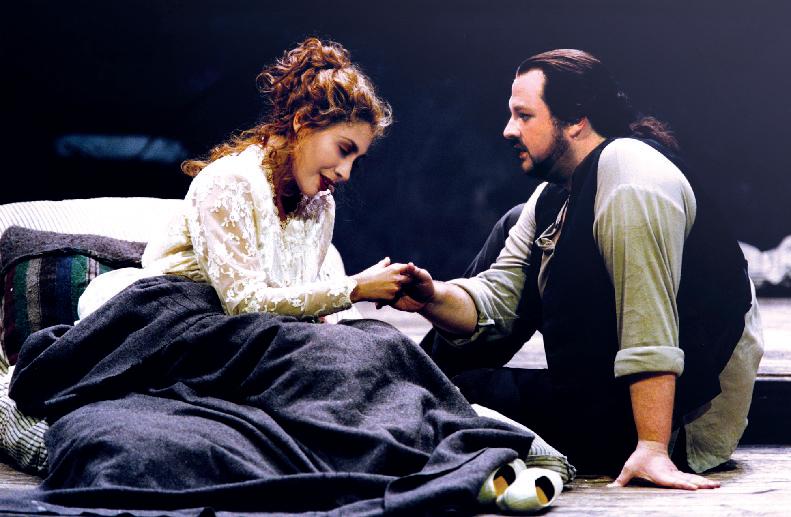
文:佳.漢密爾頓
「幕立即升起」,這樣一個特別指示替整齣 《波希米亞生涯》定調;雖然普契尼在《艾 德加》和《瑪儂.萊斯科》都已棄用傳統的 序曲,但《波希米亞生涯》甫開場,隨即進 入故事的氛圍,那緊逼性叫人喘不過氣, 這充滿壓逼力量的手法可以說是樂譜最叫 人難忘的地方。
開場的音樂帶着急躁的節奏和簡短的對答 分句,一句以半音下降,一句以全音上 升,這不單是這群波希米亞人的主題,更
by Guy Hamilton
‘The curtain rises immediately’, such a specific instruction sets the tone for the whole of La bohème. Although Puccini discarded the conventional overture in both Edgar and Manon Lescaut , the immediacy with which he establishes the atmosphere of La vie de Bohème is breathtaking; such compression is perhaps the single most impressive feature of the score.
The opening music with its impetuous rhythm and brief answering phrases, one falling by semitones, the other rising by tones, belongs both to the Bohemians and specifically to Marcello. Its slightly
是特別屬於馬塞洛的,其略帶爭論形式的 力量,映襯馬塞洛和魯道夫的關係,最切 合不過;然而這個主題並不是為這齣劇所 寫的,早於15 年前,當普契尼還是米蘭音 樂學院的學生,就寫了這段音樂,放在他 的畢業作品《交響隨想曲》。在《波希米亞 生涯》中,這音樂得以好好發揮:它點綴 了開場的對話;變成木管奏出的斷奏音形 後,描繪了馬塞洛的手指怎樣冰冷,亦點 出慕茜達的心同樣冷若冰霜;在弦樂的顫 音和豎琴的琶音之後,它代表藝術家第一
次嘗試生火而失敗;樂段與魯道夫第一句 高唱的旋律成為對比,在第三幕中,兩段 音樂再被引用,預示馬塞洛的進場。
對比第一段對話調皮的三拍拍子,當哲學 家哥林尼進場,號角奏出沉重的二拍音 形,直到魯道夫的五幕劇本手稿點的火開 始微弱,音樂再次輕快起來,這生動活潑 的旋律,記號是「堅定的」、「很富節奏 的」,代表蕭納德;在他發現他跟英國貴 族的會面和謀殺鸚鵡的故事並沒人聽,眾 人都只對食物和溫暖一擁而上,音樂才再 起明顯的變化。
在〈活潑的小快板〉中,蕭納德描述街道上 傳來的飯香,閣樓以外的世界才首次被引 進劇中。帶着柔和琶音的豎琴三和弦,配 合來回擺動的大提琴旋律線,就如魔術咒 語,勾畫出拉丁區平安夜的景象;同樣的 音樂,在第二幕開始時,以較快的速度, 並用〈最強音〉由小號奏出,卻表現了摩姆 咖啡館外的人聲鼎沸;到第三幕冬天那一 場開始時,純五度的段落也帶着這個代表 外面世界的音樂痕跡;能這樣有效的重用 他的素材,普契尼的手段實在使人驚歎。
argumentative energy is perfectly suited to the relationship between Marcello and Rodolfo, but it was not invented specifically for this score. Puccini had written the music some 15 years before when he himself was a student at the Milan Conservatory; it exists as a graduation work, the Capriccio Sinfonico, but he puts it to very good use here. It punctuates the opening dialogue; as a very staccato figure in the woodwind it illustrates the iciness of Marcello’s fingers, and Musetta’s heart; after string tremolos and harp arpeggios it represents the first unfruitful attempts to make a fire. It is contrasted with the soaring melody of Rodolfo’s first line, and like it, is used in Act III to herald Marcello’s entrance.
By contrast to the swinging triple metre of this first dialogue, Colline, the philosopher, enters to heavier duple figure in the horns, and it is not until the flames of Rodolfo’s five-act drama finally gutter that the buoyant character is restored. This jaunty melody, marked deciso and ben ritmato, belongs exclusively to Schaunard. It is not until he realises that the account of his meeting with an English Lord and the murder of a parrot has been ignored, in the rush for food and warmth, that the music reaches its next significant change.
It is at the allegretto mosso, Schaunard’s description of the smell of the cooking in the street, that the world outside the attic is introduced. The gently arpeggiated harp triads over an oscillating cello line work like a magic spell to conjure up Christmas Eve in the Latin Quarter. But the same music played fast and fortissimo by the trumpets at the start of Act II reveals a more hectic activity outside the Café Momus. There is surely also a vestige of this outdoors music in the bare fifths that open the wintry scene of Act III. Such is the impressive economy with which Puccini handles his material.
讓我們回到第一幕,房東貝諾阿的出現延 續了閣樓中戲劇性的熱鬧,這在結構上與
Returning to Act I, the arrival of Benoit the landlord provides a further excuse for play-acting in the attic – a direct formal parallel with the dancing and mock battle of Act IV – before the second magic change,
第四幕的舞蹈和比劍玩耍是直接對應的; 接着第二個魔法般的轉變出現,第二轉位
D大調和弦宣佈咪咪的到來,跟着的兩首 詠歎調和對唱營造了一個與外間隔絕的世 界,在情節發展上是繼閣樓和街道上的另 一層次。咪咪純潔的音樂、主導的弦樂和 透明的器樂配搭,表現出這個二人世界與 外間相距那麼遙遠,當街上傳來藝術家哼 出的咖啡館調子,更突出了兩個世界的南 轅北轍。
差不多所有音樂素材都已出現,只剩下慕 茜達的主題 跳動的三拍音形,在第三 和第四幕她出場時,普契尼以此為動機。
相比第一幕佔去了三個層次的情節,第二 幕則約有六個之多,並同時進行,令這一 幕在編排上,可以說是所有歌劇中最複雜 的一場;人群、街上的小販、孩子與母 親、藝術家、慕茜達和士兵,他們的音樂 交織在一起,錯綜複雜得要通過細心分析 才能理清,但普契尼卻能在短速的時間用 音樂表現出各項細節。在這熱鬧紛呈的一 幕中,惟一讓人喘息的是慕茜達為馬塞洛 表演的歌舞,這是整個場景的軸心,把第 二對戀人放在舞台動作的焦點以建立他們 的關係;對比之下,在第一幕中,建立第 一對戀人的手法剛好相反,他們私下的對 唱,卻是在情節動作之外。
在這些喧嚷當中,普契尼引入了一個荒誕 的聲音 玩具小販帕皮諾的叫聲在空中 迴響,高音的木管和弦伴隨着他那像禮拜 儀式的叫賣聲,愁悶而哀傷,就像哭訴人 群中的孤獨。
the second inversion D major chord which announces the arrival of Mimì. The two arias and duet which follow occupy a private world, another level of action from the attic and the street. The distance is expressed by the simplicity of Mimì’s music, the predominance of the strings and the translucence of the orchestration. It is heightened by the brief interruption of the Bohemians downstairs whose snatch of café song now seems worlds away.
Almost all the musical material is now before us. One exception is Musetta’s music, a skipping triple-metre figure which Puccini also uses as a motif for her appearances in Acts III and IV. If Act I occupies three levels of action, Act II has about six almost all simultaneously before us, and is in consequence arguably the most complex scene to stage in any opera. The crowd, the street-sellers, children and their mothers, the Bohemians and Musetta and finally the soldiers all have their music in a tapestry whose complexity can only be revealed by slow study, so rapidly does Puccini realise it in the music. In fact the only pause for dramatic breath in this act is the cabaret Musetta performs for Marcello. This is the pivot of the scene and establishes the relationship between the second pair of lovers by making them the focus of the action, in direct contrast to the privacy of the duet in Act I which divorces the lovers from it.
Amidst this turmoil Puccini introduces a surreal sound for a character whose cry echoes after the work is finished: Parpignol the toy-seller. The high woodwind chord which accompanies his almost liturgical call is wistful and sad; it seems like loneliness in a crowd.
第一幕、第二幕的焦點分別在最後和中
間,第三幕開始時,普契尼用了一大段音 樂,氣氛營造一絲不茍,〈很弱的〉大提琴 顫音延續了 142 個小節,笛子、豎琴和木
Whereas the focal points of Acts I and II are at the end and middle of the Acts respectively, Puccini opens Act III with a long section of scrupulous atmosphere-building. Over a pianissimo cello tremolo lasting 142 bars, flutes and harp and bare fifths in the woodwind illustrate the snow falling in the cold morning and the warmth within the inn at
管的純五度音程描繪了雪花紛飛的寒冷清 晨,以及城門上酒館况的溫暖,場景的每 一細節在雪停之前都交代好,這段展示部 巧妙而簡單,把我們帶離聖誕節的繁喧, 投入這場探討兩對戀人關係的一幕。在帶
出劇情高潮的四重奏下,一對戀人決定和 平分手,另一對則繼續糾纏不清,這個處 理在形式上比擬《唐.喬望尼》和《弄臣》。
最後的一幕大量引用第一幕的主題,但開 始時馬塞洛和魯道夫的對唱,對比第一幕 的來得無精打采。現在他們為情所困而無 心工作,不能再抱怨因為寒冷,只能歸咎 於他們的筆和畫筆。在第一幕房東貝諾阿 出場過後,他們仍可在他們的世界自得其 樂,但在這一幕,蕭納德帶頭比手畫腳猜 啞謎,來提高他們的鬥志,卻戲劇性的被 慕茜達和一個〈很強的〉E小調和弦打斷, 情節即時墜落悲劇的境地,直到劇終;即 使讓人聯想到第一幕的音樂,仍不能緩和 沉重的氣氛;由此刻起,樂器配搭開始薄 弱,就像咪咪逐漸衰竭的生命,也蠶食了 音樂的方向,這個沉靜更影響到慕茜達一 向快活的調子,當咪咪問「是誰?」慕茜達 的回答由弦樂的和聲伴着,優美醉人,對 她來說是前所未有的;當魯道夫最後發現 咪咪已經離世,樂團再次全力齊奏,這是 一段咪咪之前唱過的調子,那時她溫柔地 告訴魯道夫他是她所有的愛和生命;當音 樂最後以〈很強的〉再次奏起,眾人已經無 言,只有魯道夫在叫喚咪咪的名字。
© 威爾斯國立歌劇院
the city gate. Every detail of the scene is realised to the extent of the snow stopping for the first time. The effect of this masterfully simple exposition is to distance us from the commotion of Christmas and set the scene for the examination of the relationships of the four lovers. The culminating quartet where two decide to part peacefully while the other pair carry on a running battle has formal antecedents in Don Giovanni and Rigoletto
The final act uses themes from Act I extensively. But the opening duet between Marcello and Rodolfo seems languid by comparison to its equivalent in Act I. Now instead of being unable to work for cold, they blame their pens and brushes for this lovesick lack industry. And instead of dissolving into a magical private world as in Act I after the Benoit episode, the charade which Schaunard initiates to lift their spirits is dramatically interrupted by Musetta and a fortissimo E minor chord. The action is plunged into a tragic mode which persists until the end, unalleviated by the musical reminiscences which drift in from Act I. From this moment on, the orchestration thins out as if the life ebbing from Mimì saps the music of its own strength of direction. The calm even affects Musetta’s volatile writing and when Mimì ask ‘who is there?’, Musetta answers accompanied by a harmonic progression in the strings which is quite new for her and absolutely ravishing. It is not until Rodolfo’s final realisation of Mimì’s death that the full weight of the orchestra tutti is used again. This is music we have heard before from Mimì herself, when she gently tells Rodolfo that he is her whole life and love; but when it returns fortissimo at last, there are no words, as Rodolfo can only call her name.
© Welsh National Opera
本劇首演時, 佳.漢密爾頓
任職威爾斯國立歌劇院音樂部門
Guy Hamilton was a member of Welsh National Opera music staff during the original production
威爾斯國立歌劇院

威爾斯國立歌劇院是歐洲最活躍的巡迴歌 劇團,亦是英國最主要的巡迴歌劇表演團 體,服務當地超過 1200 萬人。 2004 年秋 季,劇團進駐位於卡迪夫港灣的威爾斯千 禧藝術中心,這座耗資一億英鎊興建的新 劇院便成為了劇團首個駐地。
劇院屢次榮獲赫赫有名的國家級獎項,藝 術成就備受肯定,包括《旗幟晚報》大獎、 四獲巴克萊戲劇大獎、兩奪羅蘭士.奧利 花大獎,以及五次獲得皇家愛樂協會大 獎; 2002 年 12 月,《古典音樂》雜誌慶祝 成立10 周年的同時,給威爾斯國立歌劇院 頒發 Red F 大獎,以表揚劇院對古典音樂 的傑出貢獻。
劇院的重點計劃 WNO MAX 是一個多元化 的綜合計劃,以推廣傳統舞台以外的表演 和藝術項目為目標, WNO MAX 以創新的 演出機會,通過參與和準備現場歌劇的體 驗,發揮歌劇懾人的魅力。
威爾斯國立歌劇院的合唱團和交響樂團同 是得到國際樂評和觀眾認同的世界級藝
團,足跡遍及威爾斯、英國及世界各地, 每年推出起碼七齣歌劇,超過90 場演出, 觀眾逾15 萬。劇院每兩年便於倫敦的劇季 演出,而在貝爾法斯特大歌劇院的駐院演 出也很成功;此外,他們也參與各樣的藝 術工作,包括灌錄唱片及 WNO MAX 的教 育和推廣工作。
Welsh National Opera is Europe’s busiest touring opera company and the largest provider of touring opera in the UK, serving a catchment area of over 12 million people in Britain. In Autumn 2004, WNO moved into its first-ever home theatre in the new £100m Wales Millennium Centre (WMC) in Cardiff Bay.
The Opera’s artistic achievements have been recognised by a succession of prestigious UK national awards, including an Evening Standard Award, four Barclays Theatre Awards, two Laurence Olivier Awards and five Royal Philharmonic Society Awards. In December 2002, in recognition of its outstanding contribution to classical music, WNO was awarded a Classic FM Red F Award as part of Classic FM’s 10th birthday celebrations.
At the heart of the company is WNO MAX, a diverse and integrated programme of performances and projects beyond the main stage. WNO MAX aims to create new opportunities which electrify and enrapture, through participation in and preparation for live opera experiences.
The Chorus and Orchestra of Welsh National Opera are recognised as a world-class ensemble by both critics and audiences. They tour extensively throughout Wales, the UK and internationally presenting over 90 performances annually of at least seven operas each year, to over 150,000 people. Every two years, the Company presents a major season of opera in London and has enjoyed successful residencies at The Grand Opera House, Belfast, as well as taking part in many other projects such as recordings, and education and outreach events as part of WNO MAX.
音樂總監
指揮
自威爾斯國立歌劇院在2004 年搬往威爾斯千禧藝術中心開始,卡洛. 里齊即再度擔任劇院的音樂總監,第二度帶領歌劇院。
里齊是博洛尼亞市立歌劇院的首席客席指揮,在紐約大都會歌劇院、 高文花園皇家歌劇院、巴黎巴士底歌劇院、蘇黎世歌劇院、荷蘭歌劇 院及米蘭史卡拉歌劇院等製作,亦常出任指揮,曾與他合作的包括所有 倫敦主要的管弦樂團、芝加哥交響樂團、洛杉磯愛樂樂團、法國國家樂 團、以色列愛樂樂團、斯德哥爾摩愛樂樂團及羅馬賽西利亞學院管弦樂 團;錄音作品有《茶花女》、《弄臣》、《浮士德》、《假面舞會》、《仙 奇緣》、
《雷史碧基的交響詩》和整套《阿萊城姑娘》的音樂。
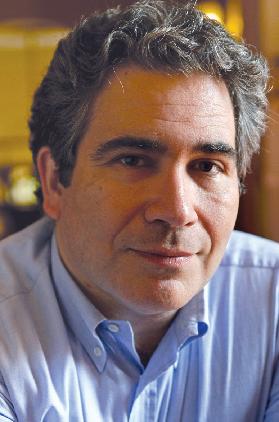
里齊最近的工作包括:首次亮相薩爾茨堡藝術節,指揮全新製作的《茶花女》,並製成唱片及 DVD ; 聯同博洛尼亞市立歌劇院在日本巡迴演出《遊吟詩人》及《安德萊.徹尼埃》(後以 DVD 發行)和聖馬田 樂團在波蘭和倫敦的首演。本樂季初,他在蘇黎世演出《唐.卡洛斯》,並與里昂國立管弦樂團及萊 比錫布業大廳樂團合作演出。未來計劃包括與休斯敦大歌劇院和紐約大都會歌劇院等合作。
Carlo Rizzi is Music Director of Welsh National Opera, returning to the company in 2004 as it took up residence at the Wales Millennium Centre.
He is principal guest conductor of Teatro Comunale di Bologna and a regular conductor at the Metropolitan Opera, Royal Opera House, Covent Garden, Opéra de Bastille, Zurich Opera, Netherlands Opera and La Scala. He has appeared with all the major London orchestras, as well as the Chicago Symphony, LA Philharmonic, Orchestre Nation al de France, Israel Philharmonic, Stockholm Philharmonic and Orchestra of Santa Cecilia, Rome. His recordings include La traviata, Rigoletto, Faust, Un ballo in maschera and La Cenerentola, Respighi Tone Poems and the complete L’Arlesienne music.
Recent engagements include his debut at the Salzburg Festival with a new production of La traviata (released on CD and DVD), a tour in Japan conducting Teatro Comunale di Bologna in Il trovatore and Andrea Chenier, (released on DVD) and his concert debut with the Academy of Saint Martin in the Fields in Poland and London. This season began with Don Carlos in Zurich and engagements with the Orchestre National de Lyon and the Gewandhaus Orchestra. Future plans include engagements at Houston Grand Opera and the Metropolitan Opera in New York.
祖利安.博伊斯在肯特大學修讀戲劇期間,憑出色演唱贏得坎特伯里大教堂獎學金。
博伊斯先後於威爾斯歌劇學校及英國青年歌劇院畢業,並獲頒詹姆斯.潘蒂費文基 金大獎,於威爾斯音樂及戲劇學院繼續碩士課程,期間又獲德拉.溫莎 紀念獎。
他的作品包括《托斯卡》、《魔笛》、《狄多與阿尼亞斯》、《賈尼.史基基》、
《女人心》、《塞維利亞的理髮師》、《仙后》、《茶花女》、《拉克美》、《蝴蝶 夫人》和《費加羅的婚禮》。

Whilst studying Drama at the University of Kent, Julian Boyce won the Canterbury Cathedral Bursary Award for singing. He is a graduate of The Opera School (Wales), British Youth Opera and received a major award from the James Pantyfedwen Foundation to fund postgraduate studies at the Welsh College of Music and Drama, where he was awarded the Della Windsor Memorial Prize.
His repertoire includes Tosca, The Magic Flute, Dido and Aeneas, Gianni Schicci, Così fan tutte, The Barber of Seville, The Fairy Queen, La traviata, Lakme, Madama Butterfly and The Marriage of Figaro.

Paul
Charles Clarke Rodolfo (17 & 19 March)
保羅.查爾斯.克拉克生於利物浦,皇家音樂學院畢業,曾獲多個獎項 ,包括於 1989 年的凱芙琳.費麗亞歌唱比賽奪冠。
他演過的劇目包括《弄臣》、《法斯塔夫》、《茶花女》、《浮士德》 、《蝴蝶夫 人》、《西蒙.博卡內格拉》、《唐.卡洛斯》、《被出賣的新娘》、 《卡塔.卡
班諾娃》、《費黛里奧》、《蝙蝠》、《奧賽羅》、《羅密歐與茱麗葉》、《萊恩 的黃金》、《魔笛》、《拉美莫的露契亞》、《卡門》、《馬克白》、《浮士德》、《維特》、《瑪 儂》和《黛伊絲》。克拉克曾參與威爾斯國立歌劇院、紐約大都會歌劇 院和高文花園皇家歌劇院的 演出,也在世界各地的藝術節亮相,如格蘭特堡藝術節。
克拉克未來的演出計劃包括飾演《尤金.奧涅金》的連斯基和《奧賽羅 》的卡西奧。
Paul Charles Clarke was born in Liverpool and studied at the Royal College of Music. His awards include first prize in the Kathleen Ferrier Competition in 1989.
Previous engagements have included the Duke in Rigoletto, Fenton in Falstaff, Alfredo in La traviata , the title role in Faust , Pinkerton in Madama Butterfly , Gabriele Adorno in Simon Boccanegra and the title role of Don Carlos for WNO; Jenik in The Bartered Bride, Kudryas in Katya Kabanova , Jaquino in Fidelio , Alfred in Die Fledermaus and Cassio in Otello for the Metropolitan Opera; Tybalt in Roméo et Juliette, Froh in Das Rheingold and Alfredo for the Royal Opera House, Covent Garden; as well as other international engagements as Tamino in The Magic Flute, Edgardo in Lucia di Lammermoor, Pollione in Norma, Anatol in Vanessa, Don Jose in Carmen, Macduff in Macbeth, the title role in Werther, Des Grieux in Manon, Nicias in Thais, Don José at the Glyndebourne Festival; and the title role in Benvenuto Cellini.
Future engagements include Lensky in Eugene Onegin and Cassio in Otello.
夏洛特.埃莉特 Charlotte Ellett
慕茜達 Musetta
夏洛特.埃莉特在皇家北方音樂學院及國立歌劇劇場肄業,她的事業起步於格林特
堡歌劇院,在那况她飾演過《卡門》的弗拉絲基塔和《費加羅的婚禮》中的伴娘; 加盟威爾斯國立歌劇院後,曾飾演《耶奴法》的卡柔卡(後來在馬克拉斯的指揮下 灌錄成唱片)、《耶弗他》的天使和《費加羅的婚禮》中的芭芭莉娜和 蘇珊娜。
她曾在布里奇沃特音樂廳和倫敦皇家節慶音樂廳演唱莫扎特的《安魂曲》;在皇家 艾伯特演奏廳獻唱《彌賽亞》;演出普朗克的《聖母悼歌》;與皇家愛 樂樂團演唱 巴赫的《聖誕神劇》。
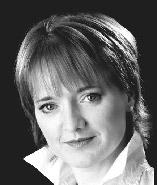
她以獨唱的角色在長野健的帶領下灌錄了馬勒的《悲傷之歌》,以及羅斯索恩的第二交響曲。
Charlotte Ellett studied at the Royal Northern College of Music and the National Opera Studio. Her career began at Glyndebourne where her roles included Frasquita in Carmen and First Bridesmaid in The Marriage of Figaro . As Associate Artist at the WNO she sang Karolka in Jen ° ufa (subsequently recorded for Chandos under Sir Charles Mackerras), Angel in Jephtha and Barbarina/Susanna in The Marriage of Figaro
She has sung Mozart’s Requiem at the Bridgewater Hall and the Royal Festival Hall; The Messiah at the Royal Albert Hall; Poulenc’s Stabat Mater; and Bach’s Christmas Oratorio with the Royal Philharmonic Opera.
Ellett has recorded Mahler’s Das Klagende Lied as a chorus soloist under Kent Nagano, and Rawsthorne’s Second Symphony.

約翰.喬伯特 John Gilbert 關卡官長 Customs Sergeant
約翰.喬伯特來自約克郡,在皇家音樂學院攻讀;曾獲頒皇家音樂學院獎學金和蒙 斯特女伯爵音樂基金。他於 1971-1973 年間是英國國家歌劇院合唱團成員; 19751977 年間在華沙音樂學院取得波蘭政府獎學金; 1979-1988 年,他是北方歌劇院合 唱團成員。在威爾斯國立歌劇團演出的角色包括《西部女郎》的礦工拉肯斯、《茶 花女》的格倫威爾醫生及《莎樂美》的第一士兵。
John Gilbert was born in Yorkshire and studied at the Royal College of Music. He has received scholarships from the Royal College of Music and the Countess of Munster Musical Trust.
From 1971-73 he was a member of the English National Opera Chorus and from 1975-77 received a Polish Government Scholarship at the Warsaw Academy of Music. He was a member of the Opera North Chorus from 1979-88.
For the WNO his roles include Larkens in La fanciulla del West, Doctor Grenvil in La traviata and 1st Soldier in Salome.
娜奧米.哈維 Naomi Harvey 咪咪(三月十七日)Mimì (17 March)
娜奧米.哈維在康沃爾出生和讀書,她在古爾德荷音樂戲劇學院學習,師從威廉. 麥埃柏。
她曾參演多齣歌劇,有《女人心》、《茶花女》、《丑角》、《外套》、《杜蘭朵》、 《魔笛》、《卡門》、《柏西法爾》、《波希米亞生涯》、《法斯塔夫》、《領事》、
《費加羅的婚禮》、《托斯卡》、《蝙蝠》、《燕子》、《彼德.格林 》,又曾擔演 威爾斯國立歌劇院《風流寡婦》的主角,參演《礦工》在皇家歌劇院琳 布利劇場的 世界首演,以及其後在巴克斯頓藝術節的演出。
娜奧米.哈維經常在英國廣播公司電台第二台的節目「週五晚、妙韻夜 」演出。
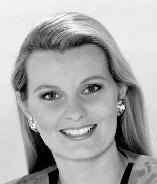
Naomi Harvey was born and educated in Cornwall, and studied with William McAlpine at the Guildhall School of Music and Drama.
Her repertoire includes Così fan tutte, La traviata, Pagliacci, Il tabarro, Turandot, The Magic Flute, Carmen, Parsifal, La bohème, Falstaff, The Consul, The Marriage of Figaro, Tosca, Die Fledermaus, La rondine, Peter Grimes and the title role of The Merry Widow for WNO; The Blackened Man (world premiere) at Linbury Studio, Royal Opera House and Buxton Festival.
Naomi Harvey appears regularly on Friday Night is Music Night for BBC Radio 2.

Gwyn Hughes Jones Rodolfo (16 & 18 March)
格溫.休斯.瓊斯來自威爾斯安格爾西島蘭貝德格治,師從戴維.浦立德; 1995 年 替威爾斯國立歌劇院飾演《那布果》中的伊斯美勒展開歌劇生涯;其他在威爾斯國 立歌劇院的角色有《弄臣》的公爵、《波希米亞生涯》的魯道夫、《愛情靈藥》的 訥摩連諾和《浮士德》的主角。
瓊斯曾演唱《賈尼.史基基》的雷諾丘、《尤金.奧涅金》的魯道夫和連斯基;其 他演出包括英國國立歌劇院《蝴蝶夫人》的平克頓,該劇更獲羅蘭士.奧利華大獎;巴黎國立歌劇 院《風流寡婦》的卡米耶.德羅斯隆;莫尼歌劇院《法斯塔夫》的芬頓;特隆赫姆音樂劇場《卡門》 的荷西;為芝加哥歌劇院飾演芬頓和平克頓;於三藩市歌劇院飾演魯道夫和伊斯美勒;紐約大都會 歌劇院演伊斯美勒和芬頓;於倫敦皇家歌劇院演平克頓和馬克杜夫。瓊斯的演唱曲目廣泛,包括威 爾第的《安魂曲》和馬勒的《悲傷之歌》,他同時是一位技巧高超的獨 唱家。
瓊斯未來的工作包括與聖菲歌劇院的首演,並會與芝加哥歌劇院再度合作。
Gwyn Hughes Jones hails from Llanbedrgoch, Anglesey and studies with David Pollard. He made his professional debut in 1995 with the WNO as Ismaele in Nabucco. Other roles for WNO include the Duke in Rigoletto, Rodolfo in La bohème, Nemorino in L’elisir d’amore and the title role in Faust
He has sung Rinuccio in Gianni Schícchí, Rodolfo/Lensky in Eugene Onegin and Pinkerton in the Olivier Award-winning Madama Butterfly for English National Opera; Camille de Rossillon in The Merry Widow with Opéra National de Paris; Fenton in Falstaff for La Monnaie; Don José in Carmen for Music Theatre Trondheim; Fenton and Pinkerton for Chicago Lyric Opera; Rodolfo and Ismaele at San Francisco Opera; Ismaele and Fenton at the Metropolitan Opera; and Pinkerton and Macduff at the Royal Opera House. His extensive concert repertoire includes Verdi’s Requiem and Mahler’s Das Lied von der Erde, and he is also an accomplished recitalist. Future engagements include his debut with Santa Fe Opera, and a return to Chicago Lyric Opera.
戴維.肯普斯特 David Kempster
馬塞洛 Marcello
戴維.肯普斯特生於威爾斯北部的奇克鎮,在皇家北方音樂學院攻讀;於 1998 年的 威爾斯新秀聲樂比賽中勝出,翌年代表威爾斯參加卡迪夫世界歌唱家大賽。
1998 年,肯普斯特加入英國國家歌劇院成為首席男中音,並參演圖納吉《銀 杯》的 世界首演、《波希米亞生涯》、《瑪儂.萊斯科》、《尼克遜訪華》及《蝴蝶夫人》; 其他演出的角色包括格蘭特堡巡迴歌劇團的《茶花女》,威爾斯國立歌劇院演出《愛 情靈藥》、《糖果屋》及《伊非格尼在陶里德》,而於達拉斯歌劇院演出《蝴蝶夫 人》的夏普萊斯,是肯普斯特首度於美國演出。

肯普斯特將為佛羅里達歌劇院演出《瑪儂.萊斯科》,以及為英國國家歌劇院重演的《卡門》演出 埃斯卡米洛。
Born in Chirk, North Wales, David Kempster studied at the Royal Northern College of Music. He won the Young Welsh Singer Competition in 1998, and in 1999 represented Wales in the Cardiff Singer of the World Competition.
Kempster joined the English National Opera as Principal Baritone in 1998 where he performed in the world premiere of Mark Anthony Turnage’s The Silver Tassie , as well as La bohème, Manon Lescaut, Nixon in China and Madama Butterfly. Other repertoire includes La traviata for Glyndebourne Touring Opera; L’elisir d’amore, Hansel and Gretel and Iphigénie en Tauride for Welsh National Opera and a US debut as Sharpless in Madama Butterfly for Dallas Opera. Future plans include Manon Lescaut for Florida Opera and Escamillo in the new production of Carmen for the English National Opera.

霍伍德.柯克
生於萊斯特郡的霍伍德.柯克在皇家音樂學院受訓,在學期間獲頒約翰.艾爾蘭獎。
柯克曾參演的藝團包括格蘭特堡歌劇院及巡迴歌劇院、英國國家歌劇院、英國巡迴 歌劇院、班普敦古典歌劇院及衛希福特歌劇節。他於 2004 年 1 月加盟威爾斯國立歌 劇院合唱團。
Born in Leicestershire, Howard Kirk trained at the Royal College of Music where he was awarded the John Ireland Prize.
Kirk has worked for the Glyndebourne Festival and Touring Opera; English National Opera and English Touring Opera among others. He joined the chorus of WNO in January 2004.
摩爾受訓於威爾斯皇家音樂及戲劇學院。
他演出的作品包括《波希米亞生涯》、《弄臣》、《燕子》、《茶花女》、《卡門》、 《假面舞會》、《被出賣的新娘》、《浮士德》、《杜蘭朵》、《托斯卡》、《阿依 達》及《魔笛》。他曾在多個劇院和藝術節獻藝,包括格蘭治園歌劇節 、皇家歌劇 院、卡盛頓歌劇院、英國巡迴歌劇院、卡度希頓歌劇院和威爾斯中部歌 劇院。
Alastair Moore trained at the Royal Welsh College of Music and Drama.

His repertoire includes La bohème, Rigoletto, La rondine, La traviata, Carmen, Un ballo in maschera, The Bartered Bride, Faust, Turandot, Tosca, Aida and The Magic Flute . He has performed with the Grange Park Opera, the Royal Opera House, English Touring Opera, Cadoxton Opera and Mid-Wales Opera.
艾曼達.魯克羅夫 咪咪(三月十六、十八及十九日)
Amanda Roocroft
Mimì (16, 18 & 19 March)
艾曼達.魯克羅夫被國際譽為英國最有前途的歌唱家之一,她在皇家北方音樂學院 畢業,並受芭芭拉.羅葆珊指導。
近期的主要演出包括首度與紐約愛樂樂團合作;與馬勒青年管弦樂團的歐洲巡迴; 與巴伐利亞國立歌劇院在日本演出《費加羅的婚禮》及貝多芬《第九交響曲》;在 阿姆斯特丹演出德克爾導演的《唐.卡洛斯》;與西門.歷圖爵士和雷 沃爾.努恩 合作,於薩爾斯堡演出《彼德.格林》,並在柏林愛樂樂團的音樂會獻 藝;與威爾斯國立歌劇院演 《尤金.奧涅金》的泰妲安娜;在柏林和巴塞隆拿演《耶奴法》的主角 。

魯克羅夫與皇家歌劇院、格蘭特堡歌劇院和慕尼黑的巴伐利亞國立歌劇院關係密切,於這些藝團演 出的角色有《唐.喬望尼》的女伯爵和愛爾維拉及《奧賽羅》的德絲黛夢娜,而在《蝴蝶夫人》、 《卡塔.卡班諾娃》和《耶奴法》更擔當主角,其他角色包括《阿里歐 唐德》的珍妮花和《凱撒大 帝》的埃及妖后。
未來的演出包括替英國國家歌劇院演《耶奴法》和荷蘭歌劇院演《卡塔 .卡班諾娃》。
Amanda Roocroft graduated from the Royal Northern College of Music and studies with Barbara Robotham. Recent highlights include her New York Philharmonic debut; European tour with Gustav Mahler Jugendorchester; The Marriage of Figaro; Beethoven’s 9th on tour in Japan with Bayerische Staatsoper; Don Carlos in Amsterdam, directed by Willy Decker; Peter Grimes with Sir Simon Rattle and Trevor Nunn in Salzburg and in concert with Berlin Philharmonic; Tatyana in Eugene Onegin for WNO; and the title role in Jen ° ufa in Berlin and Barcelona.
Roocroft has enjoyed close relationships with the Royal Opera House, Glyndebourne Festival and Bayerische Staatsoper in Munich. Her roles include the Countess, Donna Elvira in Don Giovanni, Desdemona in Otello as well as title roles in Madama Butterfly, Katya Kabanova, Jen ° ufa, Genevra in Ariodante and Cleopatra in Giulio Cesare. Future engagements include Jen ° ufa for English National Opera and Katya Kabanova for Netherlands Opera.

戴維.索爾生於諾定咸郡,在皇家音樂學院學習管風琴和唱歌,曾當過自由管風琴 手、歌手和指揮,後加盟威爾斯國立歌劇院的合唱團,演唱角色包括《尤金.奧涅 金》的將軍和扎拉特斯基、《茶花女》的格倫威爾醫生、《尤蘭塔》的伯特蘭和《魔 笛》的太陽祭司;其他曲目包括《馬克白》、《女人心》、《艾伯特.赫林》、《那 布果》和《弄臣》。
未來的演出包括:替威爾斯國立歌劇院演《卡門》的祖尼伽;《蝴蝶夫人》的舅舅; 與柯林.戴維斯爵士合作莫扎特的《安魂曲》;與製作公司雷蒙.谷比合作的《彌賽亞》和貝多芬 第九交響曲;艾爾加的《使徒》和威爾第的《安魂曲》。
David Soar was born in Nottinghamshire and studied organ and singing at the Royal Academy of Music. He joined the WNO where his roles included Captain and Zaretsky in Eugene Onegin, Doctor Grenvil in La traviata, Bertrand in Iolanta and Sarastro in The Magic Flute. Other repertoire includes Macbeth, Così fan tutte, Albert Herring, Nabucco and Rigoletto.
Future performances include Zuniga in Carmen and Bonze in Madama Butterfly for WNO; Mozart’s Requiem with Sir Colin Davis; the Messiah and Beethoven’s Symphony No 9 for Raymond Gubbay; Elgar’s The Apostles and Verdi’s Requiem
歐文.韋伯 Owen Webb
蕭納德 Schaunard
歐文.韋伯成長於南威爾斯的般特里烏,在威爾斯皇家音樂及戲劇學院修業,並獲 獎無數。
他在威爾斯國立歌劇院曾演出《弄臣》的馬魯洛、《莎樂美》的卡帕多西亞人、《斷 頭台上的修女》的長官、《卡塔.卡班諾娃》的庫利金、《崔斯坦與伊索德》的舵 手、《蝴蝶夫人》的登記長官、《唐.卡洛斯》的法蘭德大使、《唐. 喬望尼》的 馬塞多。其他曲目包括《魔笛》、《採珠人》、《卡門》、《女人心》、《蝙蝠》和 《瑪爾塔》。
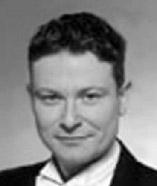
最近的音樂會演唱曲目包括《小莊嚴彌撒》、卡爾.贊健士的《和平彌 撒曲》、《約翰受難曲》、 《馬太受難曲》、《聖誕神劇》、《F大調彌撒曲》、《彌賽亞》,以及莫扎特和佛瑞的《安魂曲》。
Owen Webb was brought up in Pontiliw, South Wales. He studied at the Royal Welsh College of Music and Drama where he won numerous awards.
His roles for the WNO include Marullo in Rigoletto, Cappadocian in Salome, 1st Officer in The Carmelites, Kuligin in Katya Kabanova , Helmsman in Tristan and Isolde, Official Registrar in Madama Butterfly, Flemish Deputy in Don Carlos and Masetto in Don Giovanni. Other repertoire includes The Magic Flute, The Pearl Fishers, Carmen, Così fan tutte, Die Fledermaus and Martha.
Recent concert performances include Petite Messe Solennelle, Karl Jenkins’ Mass for Peace, St John Passion, St Matthew Passion, Christmas Oratorio, Mass in F Major, Messiah, and Mozart and Fauré’s Requiem.

伊恩.嚴明 Ian Yemm 帕皮諾 Parpignol
來自什羅普郡的伊恩.嚴明,自 2003 年開始成為威爾斯國立歌劇團合唱團的成員。
他於皇家音樂學院及皇家音樂學校歌劇部畢業後,即加入格蘭特堡歌劇院合唱團。
嚴明於威爾斯國立歌劇院演出的角色有《尤蘭塔》的阿爾梅里克;在皇家艾伯特演 奏廳舉行的英國廣播公司逍遙音樂會首度亮相;和牛津城市歌劇院演出《波希米亞 生涯》的魯道夫;他對巴羅克音樂及布列頓的男高音作品尤其熱中。
Ian Yemm is from Shropshire and has been a member of the WNO Chorus since 2003. He studied at the Royal Academy of Music and the Opera School of the Royal College of Music before joining the Glynbourne Chorus.
Recent roles for WNO include Almeric in Iolanta, making his BBC Proms principal debut at the Royal Albert Hall, and he sung the role of Rodolfo in La bohème for Oxford City Opera. He has special interests in Baroque music and in the works for tenor voice by Benjamin Britten.
戈蘭.雅弗費特 Göran Järvefelt (1947-1989)
戈蘭.雅弗費特生於瑞典的海爾辛蘭,在斯德哥爾摩讀書;他有豐富的 監製經驗,曾於斯德哥爾 摩、奧斯陸、哥本哈根、蓋爾森基興、柏林、慕尼黑、威斯巴登、史圖加、尼斯、普羅旺斯艾克斯 市、巴黎、蘇黎世、日內瓦、阿姆斯特丹、聖菲、休斯頓、溫哥華、悉尼、帕爾馬、紐約大都會歌 劇院和阿得萊德藝術節出任監製。
雅弗費特在英國的首演是在 1979 年導演威爾斯國立歌劇院的《魔笛》,後來他們繼續合作,製作 了《假面舞會》(1982) 、《萊恩的黃金》(1983) 、《女武神》(1984) 、《齊格弗里德》(1985) 、《眾神的 黃昏》(1986) 、《茶花女》(1988) 和《玫瑰騎士》的前期工作(由沃爾夫岡.韋伯於 1989 完成)。
Göran Järvefelt was born in Hälsingland, Sweden, and studied in Stockholm. He worked as a producer in Stockholm, Oslo, Copenhagen, Gelsenkirchen, Berlin, Munich, Wiesbaden, Stuttgart, Nice, Aix-en-Provence, Paris, Zurich, Geneva, Amsterdam, Santa Fe, Houston, Vancouver, Sydney, Parma, the Metropolitan Opera, New York and the Adelaide Festival.
Järvefelt made his British debut with the WNO in 1979, staging The Magic Flute, and during subsequent years he returned to stage Un ballo in maschera (1982), The Rhinegold (1983), The Valkyrie (1984), Siegfried (1985), Twilight of the Gods (1986), La traviata (1988) and preparatory work on Der Rosenkavalier (realised by Wolfgang Weber in 1989).
生於曼徹斯特的卡羅琳.錢尼自 1991 年起擔任威爾斯國立歌劇院的全職導演,期間她重整過《費 加羅的婚禮》、《魔笛》和《波希米亞生涯》;她參與過多個製作,曾 經合作過的導演包括帕翠 克.考利爾、摩沙.萊瑟、添.艾伯里、菲麗達.勞埃德、約翰.克羅利、尼爾.阿姆菲爾德、戴 維.龐特尼、凱蒂.米歇爾、戴維.奧爾登、基斯度化.奧爾登和喬基 姆.賀茲。
Born in Manchester, Caroline Chaney has worked as a staff director for the WNO since 1991. During that time she has revived The Marriage of Figaro, The Magic Flute and La bohème.
She has assisted on many productions and has worked with directors Patrice Caurier, Moshe Leiser, Tim Albery, Phyllida Lloyd, John Crowley, Neil Armfield, David Pountney, Katie Mitchell, David Alden, Christopher Alden and Joachim Herz.
米高.雅根 Michael Yeargan 原創設計 Original Designer
生於德克薩斯州,曾是耶魯大學戲劇學院的舞台設計教授,以及耶魯劇目劇團的駐團設計師。在美
國,有豐富的地區劇團工作經驗,也曾參與百老匯演出的設計工作。首次在英國參與設計的劇目, 是塞賓製作的威爾斯國立歌劇院作品《尤金.奧涅金》,其後還設計了《羅代琳達》、《風流寡婦》、 《波希米亞生涯》及《貝翠斯與本尼迪克》。其他製作還包括蘇格蘭歌 劇院的《卡門》、《波希米亞
生涯》及《命運之力》;澳洲歌劇院的《維特》、《弄臣》及《塞維利 亞的理髮師》;高文花園皇 家歌劇院的《西蒙.博卡內格拉》、《清教徒》及《阿依達》;倫敦西 城的《大鼻子情聖》;以及 紐約大都會歌劇院的《歡樂人間》及《奧塞羅》。
Michael Yeargan was born in Texas. He was Professor of Stage Design at Yale University School of Drama and resident designer at Yale Repertory Theatre. In America he has designed on Broadway and extensively in regional theatre. He debuted in Britain with WNO designing Serban’s production of Eugene Onegin. Also for WNO Rodelinda, The Merry Widow, La bohème and Béatrice et Bénédict. Elsewhere his work includes Carmen, La bohème and La forza del destino for Scottish Opera; Werther, Rigoletto and The Barber of Seville for Australian Opera; Simon Boccanegra, I puritani, Stiffelio and Aida for the Royal Opera House, Covent Garden; Cyrano de Bergerac in the West End and Ariadne auf Naxos and Otello for the Metropolitan Opera, New York.
Original Lighting Designer
在布里斯托出生,於巴斯就讀。 1976 至 1983 年間擔任威爾斯國立歌劇院的總燈光設計,現為布里 斯托老維歌劇院學校的燈光及音響主任。
作品包括皇家莎士比亞劇團的《茶花女》;倫敦多瑪倉庫劇院的《簡單》;巴塞隆拿的《 Mar i Cel 》 及《 Flor de Nit 》;北部舞台劇院的《好》及《秘密被提》;威爾斯國立歌劇院的《波希米亞生涯》、 《弄臣》、《沒有影子的女人》、《蝴蝶夫人》、《費黛里奧》、《卡 塔.卡班諾娃》、《化裝舞 會》、《卡門》、《彼德.格蘭姆斯》、《魔笛》及《埃爾納尼》;北方劇院的《耶奴法》及《蝴 蝶夫人》;蘇格蘭歌劇院的《遊吟詩人》及《耶奴法》;在南錫上演的《尤金.奧涅金》;以及在 巴塞隆拿、葡萄牙、德國、荷蘭、挪威及加拿大上演的《魔笛》。
John Waterhouse was born in Bristol and studied in Bath. He was WNO’s Head of Lighting from 1976 to 1983 and is currently Head of Lighting and Sound at the Bristol Old Vic Theatre School. His work includes Camille for the Royal Shakespeare Company; Simplicity at the Donmar Warehouse, London; Mar i Ce l and Flor de Nit in Barcelona; Good and Secret Rapture for Northern Stage Company; La bohème, Rigoletto, Die Frau ohne Schatten, Madama Butterfly, Fidelio, Katya Kabanova, Un ballo in maschera, Carmen, Peter Grimes, The Magic Flute and Ernani for WNO; Jen ° ufa and Madama Butterfly for Opera North; Il trovatore and Jen ° ufa for Scottish Opera; Eugene Onegin in Nancy; and The Magic Flute in Barcelona, Portugal, Germany, Netherlands, Norway and Canada.
威爾斯國立歌劇院樂團
音樂總監 Music Director
卡洛.里齊 Carlo Rizzi
副指揮 Associate Conductor
Michal Klauza
領奏 Leader
John Stein
第一小提琴 1st Violins
Simon Lewis 香港領奏 Leader in HK
Lowri Porter
Martin Kegelmann
Robert Tonkin
Catherine Hings
Peter Lilley
Emma Kerr
Laurence Kempton
Jane Atkinson
Susan Plessner
Mathias Maurer
Roger Foxwell
第二小提琴 2nd Violins
Antony Tarlton
Donald McNaught
Ann Jones
Emma Waller
Luke Roskams
Gillian Bradley
Jane West
Deborah Neath
Alison Balfour Paul
Craig Pecherek
中提琴 Violas
Philip Heyman
Cédric David
Barry Friend
Domini Lipman
Stephen Lloyd
Louise Brodrick
Katie Stables
Lisanne Melchior
大提琴 Cellos
Dewi Watkins
Christopher Hodges
Arthur Davies
Simon Davison
Alexandra Robinson
Andrew Elliott
低音大提琴 Double Basses
John Law
Mikeal Price
Mary Condliffe
Peter Fry
笛 Flutes
Jonathan Burgess
Nicola Dowton
短笛 Piccolo
Maxine Willis
雙簧管 Oboes
Murray Johnston
Graeme Adams
英國管 Cor Anglais
David Probert
單簧管 Clarinets
Leslie Craven
Daniel Rye
低音單簧管 Bass Clarinet
Peter Fielding
巴松管 Bassoons
Stephen Marsden
Christopher Vale
圓號 Horns
Angus West
Donald Clist
David Shillaw
James Mildred
小號 Trumpets
Dean Wright
Martin McHale
Robert Johnston
長號 Trombones
Roger Cutts
John Hendy
David Vines
Ian Fasham
定音鼓 Timpani
Phil Girling
敲擊樂 Percussion
Jonathan Helm
Andrew Cookson
Anna Newman
Cliff Prior
豎琴 Harp
Katherine Thomas
舞台樂手 STAGE BAND
短笛 Piccolos
Timothy Taylorson
Catherine Mayer
小號 Trumpets
Jonathan Mainwaring
Terry Lax
敲擊樂 Percussion
Andrew Cookson
音樂總監 Music Director
卡洛.里齊 Carlo Rizzi
署理合唱團指導 Acting Chorus Master
Simon Phillippo
女高音 Sopranos
Meriel Andrew
Anitra Blaxhall
Paula Bradbury
Megan Llewellyn Dorke
Claire Hampton
Fiona Harrison
Rosie Hay
Samantha Hay
Laura Pooley
女中音 Mezzo-sopranos
Amanda Baldwin
Neda Bizzarri
Daniella Ehrlich
Jessica Handley Greaves
Helen Greenaway
Dorothy Hood
Sian Meinir
Anne Morgan
Nicola Morgan
Sarah Pope
男高音 Tenors
Michael Clifton-Thompson
Simon Curtis
Paul Gyton
Philip Lloyd Holtam
Alun Rhys Jenkins
Howard Kirk
Gareth Lloyd
Philip Pooley
Gary Watkins
Ian Yemm
男低音 Basses
Robert Winslade Anderson
Julian Boyce
Ashley Bremner
Daniel Chadwick
John Gilbert
Martin Lloyd
Philip Lloyd-Evans
Alastair Moore
Jack O’Kelly
James Robinson-May
香港藝術節兒童合唱團 Festival Children’s Chorus
合唱指導 Chorus Master
符潤光 Raymond Fu
團員 Members
歐晨鋒 Wilfred Au
Cassia E Patel
何瀚芯 Ho Hon-sum
何瀚昕 Ho Hon-yan
何尚軒 Ho Sheung-hin
排練琴師 Rehearsal Pianist
楊欣諾 Felix Yeung
許希家 Hui See-chia
甘皓輝 Gordon Kam
林凱妍 Wendy Lam
李岳嶸 Edwin Li Ngok-wing
盧俊泓 Timothy Lo Chun-wan
樂團及合唱團管理 Orchestra and Chorus Management
樂團及合唱團總監 Orchestra and Chorus Director
Peter Harrap
合唱團經理 Chorus Manager
Wendy Franklin
助理合唱團經理
Assistant to Chorus Manager
Michael Clifton-Thompson
樂團經理 Orchestra Manager
Philip Boughton
助理樂團經理
Assistant to Orchestra Manager
Peter Lilley
署理舞台經理
Acting Pit / Platform Manager
Damien Bellamy
樂團助理 Orchestra Attendant
Hywel Evans
音樂圖書管理員 Music Librarian
Georgina Govier
合唱團及樂團總監秘書 / 助理圖書管理員
Secretary to Chorus and Orchestra
Director / Librarian’s Assistant
Rebecca Donkin
合唱團統籌 Chorus Coordinator
楊雪筠 Shirley Yeung
蒙樂怡 Carol Mung Lok-yee
Louise Sinclair Willman
胡偉奇 Wicky Woo Wai-kei
楊程 Yeung Ching